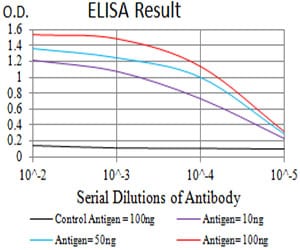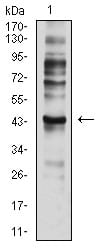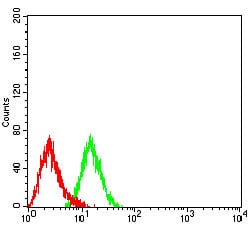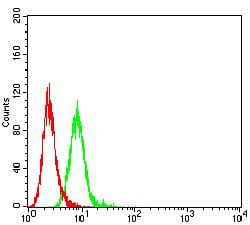



| WB | 1/500 - 1/2000 | Human,Mouse,Rat |
| IF | 咨询技术 | Human,Mouse,Rat |
| IHC | 咨询技术 | Human,Mouse,Rat |
| ICC | 技术咨询 | Human,Mouse,Rat |
| FCM | 1/200 - 1/400 | Human,Mouse,Rat |
| Elisa | 1/10000 | Human,Mouse,Rat |
| Aliases | BLR2; EBI1; CCR-7; CCR7; CDw197; CMKBR7; CC-CKR-7 |
| Entrez GeneID | 1236 |
| clone | 4B7B8 |
| WB Predicted band size | 42.9kDa |
| Host/Isotype | Mouse IgG1 |
| Antibody Type | Primary antibody |
| Storage | Store at 4°C short term. Aliquot and store at -20°C long term. Avoid freeze/thaw cycles. |
| Species Reactivity | Human |
| Immunogen | Purified recombinant fragment of human CD197 (AA: extra mix) expressed in E. Coli. |
| Formulation | Purified antibody in PBS with 0.05% sodium azide |
+ +
以下是3篇与CD197(CCR7)抗体相关的文献概览:
---
1. **文献名称**:*CCR7 governs skin dendritic cell migration under inflammatory and steady-state conditions*
**作者**:Förster, R., et al.
**摘要**:研究CCR7在皮肤树突状细胞迁移中的作用,利用抗CCR7抗体阻断实验证明CCR7是介导树突状细胞向淋巴结归巢的关键分子,为免疫应答机制提供依据。
---
2. **文献名称**:*CCR7 as a therapeutic target in cancer*
**作者**:Müller, A., et al.
**摘要**:综述CCR7在肿瘤转移中的功能,通过抗CCR7抗体实验揭示其促进癌细胞淋巴转移的机制,提出靶向CCR7可能成为抑制癌症转移的新策略。
---
3. **文献名称**:*Differential expression of CCR7 in T cell subsets: Implications for immune monitoring*
**作者**:Sallusto, F., et al.
**摘要**:利用流式细胞术结合抗CCR7抗体,分析不同T细胞亚群(如初始T细胞与记忆T细胞)中CCR7的表达差异,为免疫疾病诊断提供标志物参考。
---
4. **文献名称**:*CCR7 antibody enhances antitumor immunity by promoting dendritic cell cross-presentation*
**作者**:Curiel, T.J., et al.
**摘要**:研究抗CCR7抗体对树突状细胞功能的调控,发现其通过增强抗原提呈能力改善肿瘤微环境中的T细胞激活,支持其在免疫治疗中的应用潜力。
---
以上文献涵盖了CD197抗体在基础免疫机制、癌症治疗靶点及免疫监测中的研究应用。如需具体文献来源(期刊、年份等),可进一步补充信息。
CD197. also known as CCR7 (C-C chemokine receptor type 7), is a G protein-coupled receptor that plays a critical role in immune cell migration and lymphoid tissue homeostasis. It binds to chemokines CCL19 and CCL21. guiding dendritic cells, T cells, and B cells to secondary lymphoid organs (e.g., lymph nodes) to initiate adaptive immune responses. CCR7 is essential for T cell activation, immune surveillance, and lymphocyte recirculation.
CD197 antibodies are tools used to detect and study CCR7 expression in research and diagnostics. They help characterize immune cell subsets, track cell trafficking patterns, and investigate CCR7's role in diseases. For instance, upregulated CCR7 is linked to cancer metastasis (e.g., promoting lymph node invasion) and autoimmune disorders, while its dysfunction may impair immune tolerance. These antibodies are widely applied in flow cytometry, immunohistochemistry, and functional studies to evaluate therapeutic targeting potential.
In therapeutic development, CCR7 inhibitors or neutralizing antibodies are explored to block pathogenic cell migration in cancer or inflammation. Conversely, enhancing CCR7 signaling might improve vaccine efficacy by boosting antigen-presenting cell recruitment. The dual role of CCR7 in immune regulation and disease progression makes it a compelling biomarker and therapeutic target, driving ongoing research into its mechanisms and applications.
×